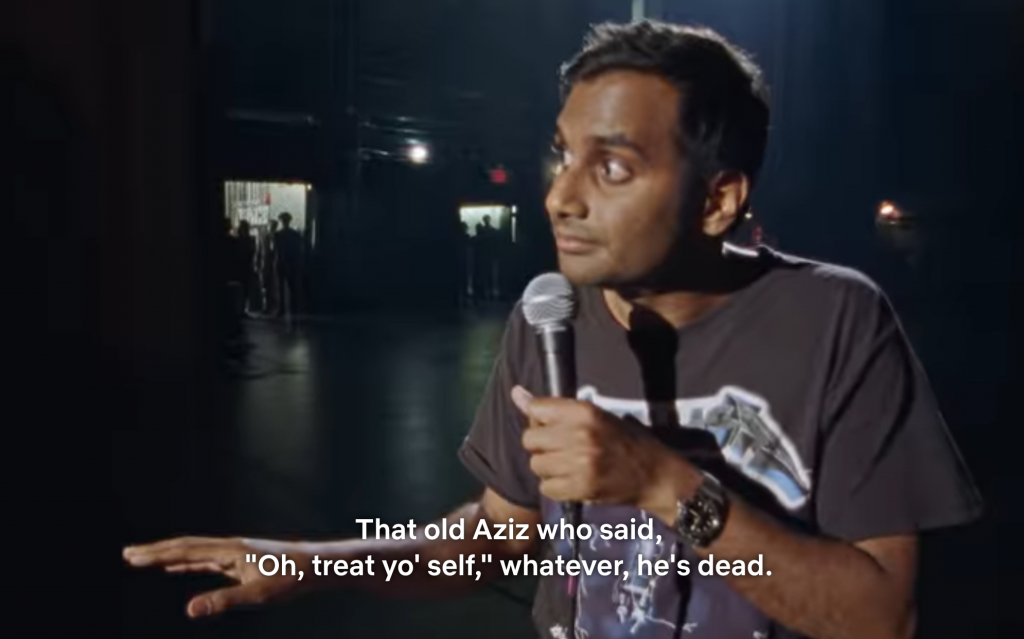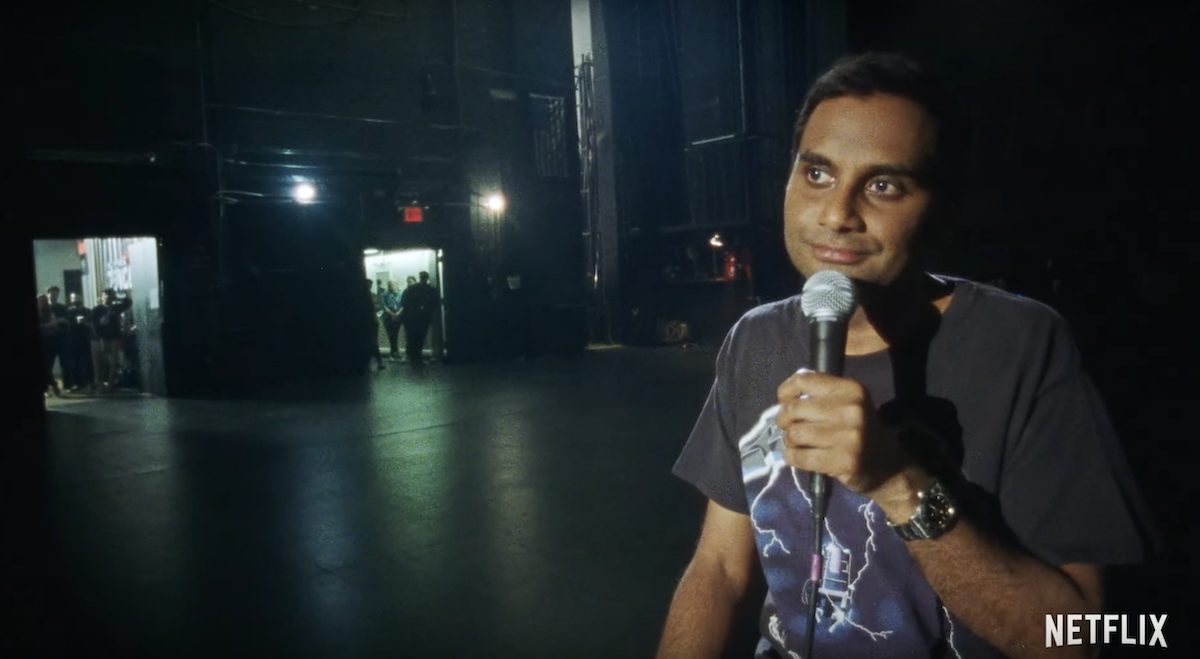If you’re looking for my review of Aziz Ansari’s new Netflix special, Right Now, right now it’s on Decider.
Media outlets generally avoid running critiques of stand-up specials. For whatever reason, some 12 years after I started The Comic’s Comic, there’s still not a lot of others taking a critical look at comedy — despite all of the journalists and bloggers who weigh in on movies, music and other performing arts. But when a comedian breaks through the noise, or even becomes the noise, the mainstream media and everyone else will rush in with their own hot takes and think-pieces.
Ansari knew this when he got Spike Jonze to film his Brooklyn tour stops in May, and astutely built Right Now to not so much win over the haters, as show them that he’ll win no matter what they think of him. He even illustrates this with a bit designed to fake out the audience and prove that we’ll believe what we want to believe. We suffer from confirmation bias.
For exactly that reason, I’m intrigued to see how other critics saw Aziz Ansari: Right Now. Let’s take a look around, shall we?
The Siskel to my Ebert, Jason Zinoman at The New York Times, raved about it. Ansari won Zinoman over with this hour. In part, by changing it up since earlier tour stops, when he wasn’t opening the hour with any acknowledgement of the accusations against his sexual propriety. Zinoman wrote: “This speech, or any other mention of the allegation, was not in Ansari’s show in December, when I saw him on tour (this special was shot in May) and in a column, I argued that avoiding his scandal was an artistic mistake, particularly because his show criticized a culture of online outrage in a way that felt informed by his experiences. By framing the new special around his personal story, and also trimming and refining some weak spots, his act now coheres, taking on a new force and clarity, one that represents his finest, boldest and probably most polarizing work.”
We all can agree on polarizing.
I figured Paste Magazine, which tends to go for woke, would fall on the opposite pole from the NYT. They did not let me down! Garrett Martin felt that his performance was all for show, writing of Ansari’s opening gambit: “His framing of it shows a surprising thoughtlessness, though. He’s so vague about it that you’d probably think he was the victim, if you didn’t know the story. Of course many people all along acted as if Ansari was the victim, and if he believes that himself, then it’s just proof that he didn’t learn anything or think too deeply about what happened.”
Speaking of this moment…

Martin writes: “Considering the only consequences he’s had to deal with are some harsh tweets and the occasional critical thinkpiece, and that he’s back less than 18 months later with a stand-up special directed by an Oscar-nominated filmmaker and distributed by the largest streaming platform, it’s hard to take this part as seriously as Ansari wants us to.”
The A.V. Club’s Danette Chavez subtracts points for Ansari’s manipulation of the audience’s emotions, writing: “In fact, it’s hard to watch Right Now and not think how smart, how strategic, Ansari’s choices are throughout,” since he’d spent a year honing the act. And yet, when he notes that art doesn’t always look so good in hindsight, Chavez remarks: “The fact that Ansari arrived at such a dull point raises the question of just how willing he is to turn his analysis inward; although he’s clearly grateful for the opportunity to continue with his career, for now, Ansari seems content to hold up a mirror to everyone but himself.”
Alison Herman, who writes about TV and comedy for The Ringer, gives Ansari the benefit of the doubt for being strategic. After all: “It’s tempting to dismiss the routine as disingenuous or untrustworthy, because it’s evidently been rehearsed. But, of course, that’s what stand-up is: extensively workshopped, intentionally composed jokes passed off as a spontaneous, just-so-happens-to-be-hilarious riff to an eager audience.” At the same time, however, Herman feels that Ansari’s comparisons to R. Kelly, Michael Jackson and other artists make for “awkward juxtaposition.” She agrees with the premise that the viewer’s confirmation bias will win out. “Within the space of a single set, Ansari flips from being the subject of uncomfortable questions to decisively weighing in on those same dilemmas. It’s an abrupt and audacious switch, one whose effectiveness will vary depending on the inclinations one carries into the special.”
On that note, let’s look at what conservative-minded political websites thought. Yes, they weighed in, too.
National Review‘s Robert Verbruggen opens with a full defense of Ansari, all but calling him a victim of the #MeToo movement, before declaring: “Ansari addresses the issue briefly and maturely, then launches into one of the funniest and most insightful performances of his career.” Where others had seen Ansari on tour in the past year and thought him reactionary, Verbruggen says the comedian is “far from it” and delivered an “incredibly funny hour of television.”
The Daily Caller‘s David Hookstead agreed. Hookstead’s lede? “Aziz Ansari’s new comedy special on Netflix is awesome.”
These two guys both perpetrate the idea that a woman getting forced into sex can be reduced to two words: “bad date.”
Hookstead wrote: “For what at worst could have been described as an awkward interaction during a sexual encounter, Aziz was in the headlines like he was some monster thanks to the woke mentality sweeping across our culture,” and praises Ansari for attacking those who would be woke.
It’s not so easy to say men feel one way about Aziz and women feel another.
Emma Baty’s review for Cosmopolitan acknowledges she’s happy with how Ansari decided to re-enter the national conversation. “Like many other people on the internet, my general feeling is that the men taken down by the movement should stay in their respective lane, which is completely off the road and out of my sight. That included Ansari. But after watching his “Right Now” standup special, which landed on Netflix this morning, I’m actually not mad about it.”
Indiewire’s Ben Travers believes that the awkwardness of Ansari’s approach and Jonze’s camera work makes the special better. “Is it the real deal, a carefully designed comeback, or both? Every observation Ansari makes can be tied back to his most recent bad experience, a train of thought that’s inevitable for the audience as much as the comedian. How could it not affect him, just as it had to affect viewers’ perception of him? Ansari appears to know this, and even when he ostensibly moves past the allegations, he’s embracing the messy new nature within his public persona.”
Kimberly Ricci for Uproxx also applauds Ansari for embracing the awkwardness of this moment, calling his hour “necessary viewing” for 2019. Ricci looks at how Ansari addressed the charges against himself and found: “he does not prostrate or martyr himself. He doesn’t apologize or admit guilt, either, but he doesn’t waste time before acknowledging what everyone is thinking, and he admits that he feels terrible about making someone else feel awful. No denials surface, but there’s also no pretense at hand, and no wizardry, for Jonze shoots his subject starkly and largely in close-up. And Ansari doesn’t overstretch, argue, or ask anyone to take his side. However, it remains apparent that the comedian was stunned at how distanced he felt from the perspective of his accuser.”
For Vulture, Kathryn VanArendonk gives Ansari credit for reckoning with the idea of a reckoning. “Although he doesn’t make the connections explicit, the whole set continually circles back to the related web of questions his position raises — the problems and conflicts and difficult conundrums that follow from a culture that has, somewhat abruptly, shifted into a different frame of expectations about sexual misconduct and “wokeness.””
Inkoo Kang at Slate reminds us that Ansari’s 2015 Netflix special presented his own awakening about the prevalence of “creepy dudes,” a couple of years before the Internet outed him as one. To Ansari’s credit, though, Kang writes of his new special: “It’s the most organic and tactically nimble post-#MeToo comeback thus far.”
From the national magazines and their online writing staffs…
Judy Berman at TIME opens by focusing on the lone musical selection, The Velvet Underground’s “Pale Blue Eyes,” which bookends Ansari’s performance. “One of the saddest, prettiest compositions in the history of rock, Lou Reed’s whispery ballad invokes love, infidelity, memory and regret. It leaves you with the melancholy sensation that something invaluable has been not just lost, but squandered; Reed mourns “everything I had but couldn’t keep.” It’s so universal, you can’t help mapping it onto your own personal crises—which probably explains what it’s doing on the soundtrack to a concert film that documents Ansari’s return to the stage after the darkest year of his career.” As for his actual comedy on that stage? Berman falls into the middle ground. She’s not impressed with the jokes, but hopes he keeps growing.
For Esquire, Gabrielle Bruney doesn’t believe this Ansari is much different from the one who Ansari claims “died” last year. “How did the experience make him a better person? What did he do then that he wouldn’t do now? He sounds contrite, but offers no apology for any particular action on his part—he’s only sorry that Grace “felt that way.” He spares a sentence for her feelings, and nearly a paragraph for his own. Overall, Ansari sounds as if he’s recovering from a situation in which he was the main victim. Grace, meanwhile, had her real identity leaked after she shared her story, and became a target of online hate.”
For GQ, Max Cea writes that he lowered his defenses watch Ansari, and that was Ansari’s objective, right? “The special’s bigger, and more intriguing, objective is encouraging you to process the show like you’re there in person.” If you’re willing to stay in the moment with the comedian, you’re less likely to question him, more likely to root for him.
For Vanity Fair, Sonia Saraiya writes that she comes at Ansari’s new hour slightly cynically, writing: “these are the superficial trimmings of rehabilitation.” And yet, she also feels his attempt to rehab his career has made him a better stand-up: “It turns Right Now into the most of-the-moment 2019 production I’ve seen yet—a comedy special that is sharply post-Nanette, post-#MeToo, post-Trump’s election. The first 20-ish minutes are the most honest work Ansari has done, a litany of observations about the status quo that reveals a hunger and frustration that was buried under his happy-go-lucky persona. His focus on whiteness—and the hypocrisies of white privilege—reveal an edge to his racial identity that has rarely, if ever, shown itself before. But he’s not giving into the anger, as he may have done in early performances of this set. That creates tension that yanks the audience to and fro within just one setup, reflecting what seems to be Ansari’s own multiple perspectives.”
If Ansari really wants to get back into the good graces of show business, it’ll take trade publications to help spread that word to the industry. At Variety, Caroline Framke wrote: “Despite expressing an enthusiastic willingness to have hard discussions, Ansari never quite acknowledges that flip side of the overcorrecting that makes him roll his eyes so hard. Sometimes it really can force a necessary conversation, not to mention long overdue change.”
She closes:
“It’s hard not to think about this at the end of “Right Now” when Ansari circles back to the allegation that made him rethink his entire life (and brand). Expressing his gratitude for everyone at the show, Ansari gets quiet. “I saw the world where I don’t ever get to do this again, and it almost felt like I died,” he says, going on to say that the “old Aziz who said, ‘oh treat yo self’ or whatever” might as well have died. But the fact remains that Ansari didn’t die, or anything close to it. He took a break, went on the road, sold out shows across the country, and released a Netflix directed by Spike Jonze. Ansari, both new and old, never had to apologize in order to be just fine. “
If we can agree on nothing else, Ansari has persuaded us to rethink him and his place in comedy and show business. Whether or not he’s fully committed to rethinking where he goes from here, that’s up to him to decide. Because he hasn’t filled us in on that just yet.




Ugh you seem exhausting. Sorry Aziz didn’t suffer enough for a crime you invented that he didn’t commit. Try some empathy, bro.
“In September of last year, I met a woman at a party. We exchanged numbers. We texted back and forth and eventually went on a date. We went out to dinner, and afterwards we ended up engaging in sexual activity, which by all indications was completely consensual.
“The next day, I got a text from her saying that although ‘it may have seemed okay,’ upon further reflection, she felt uncomfortable. It was true that everything did seem okay to me, so when I heard that it was not the case for her, I was surprised and concerned. I took her words to heart and responded privately after taking the time to process what she had said.
“I continue to support the movement that is happening in our culture. It is necessary and long overdue.” – Aziz Ansari
He starts off the “comedy” show talking about sexual misconduct in a strange low whisper. It was so annoying, I “moved on” & watched something else.